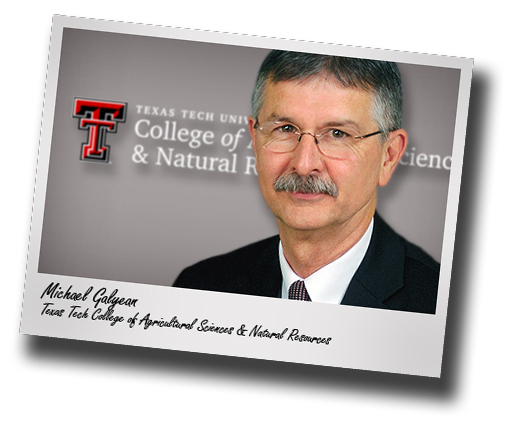Opinion: CASNR key to providing science-based expertise for economic viability
With world population expected to grow nearly a third by 2050, agricultural production will need to increase by approximately 70 percent to meet the needs of 9 billion people around the world. As incomes are projected to increase in developing countries around the globe, the demand for high-value plant-based products, as well as livestock and dairy products, is expected to skyrocket.

Given that the potential for significantly increasing arable land is limited, the challenge of meeting the world's food needs will have to be met by increasing efficiency of production, by ensuring sustainable use of land and water resources, and by transferring technologies for adoption globally.
Texas is positioned to be a major player in the worldwide expansion of food production that is expected to occur over the next 35 years. Texas leads the nation in number and in land area of farms. In addition, Texans produce more livestock, hay, and cotton that any other state, and the state ranks fourth nationally in all commodity cash receipts from farms. Agriculture is an economic powerhouse in Texas with an annual economic impact of $100 billion from the food and fiber sector. One in seven Texans are in agriculturally related jobs.
Significant Growth. The food production and natural resource management challenges of the future will only be met by a workforce capable of applying sound scientific principles and high-tech solutions that will provide sustainable global solutions for decades to come. The significant growth of jobs in agriculture and natural resources was recently recognized by the "USDA Employment Opportunity Outlook for 2010-2015."
The report indicated between 2010 and 2015, 5 percent more agricultural sciences and natural resources college graduates will be needed to meet demands in the United States. This increased demand reflects more than 54,000 new jobs annually, with 74 percent of these jobs in business and science, 15 percent in agriculture and forestry production, and 11 percent in education, communication, and government. Given its national ranking in various agricultural and natural resources sectors, Texas should be a leader in the producing these important jobs.
Science-Based Expertise. The College of Agricultural Science and Natural Resources (CASNR) at Texas Tech University provides outstanding degree programs that prepare graduates to meet the global challenges that lie ahead for the agricultural and renewable natural resources industries. Indeed, CASNR degree programs will be increasingly important in providing the science-based expertise necessary to ensure economic viability and meet critical world food, fiber, and sustainable natural resource management issues and technology transfer needs of the next three decades.
These vital CASNR degree programs are in the following areas:- Animal Science/Food Science
- Natural Resources Management
- Plant and Soil Science/Horticulture
- Agribusiness/Agricultural and Applied Economics
- Interdisciplinary Agriculture/Agricultural Communications
- Landscape Architecture
- Approximately 60 to 70 percent of graduates from CASNR degree programs take jobs in the agricultural and natural resources sector.
- Approximately 25 to 30 percent of CASNR baccalaureate graduates go on to further study in medicine, dentistry, pharmacy, veterinary medicine, and graduate school, reflecting the excellent preparation these degrees provide for post-baccalaureate education.
Written by Michael Galyean
CONTACT: Michael Galyean, Dean, College of Agricultural Sciences and Natural Resources, Texas Tech University at (806) 742-2808 or michael.galyean@ttu.edu
0401NM13
Davis College NewsCenter
-
Address
P.O. Box 42123, Lubbock, Texas 79409-2123, Dean's Office Location:Goddard Building, Room 108 -
Phone
(806)742-2808 -
Email
kris.allen@ttu.edu
